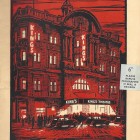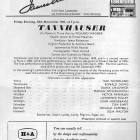Tannhäuser 1961Sadler's Wells Opera
Read more about the opera Tannhäuser
This immediate revival of the previous year's Wagner offering, launched in London in December 1959, was greeted with little enthusiasm by the Glasgow Herald - the critic found the conducting sluggish and soporific. Little in the show found praise, but for some excellent singing from the principal soloists.
The Scotsman critic on 22 November was more complimentary.
The programme specified that a hybrid edition of the opera was used - mainly the later Paris version. However the opening Venusberg scene used the original Dresden text, with its much shorter ballet sequence.
Of the cast, John Hargreaves had been a member of the company since the war. Ronald Dowd was a heroic tenor from Australia who worked with all the British companies, including Scottish Opera, through the sixties. Rae Woodland also had a long career with most of the British companies - Scottish Opera, Welsh National, Glyndebourne and the English Opera Group.
Marian Nowakowski was perhaps better known for appearances at Covent Garden and in concerts, Julia Malyon also worked at Covent Garden.
Tenor Tom Swift was soon to leave the company and move to Germany, where he spent the next decade. However he returned to work in London, with SWO/ENO at the Coliseum. By this time his repertoire concentrated on the major Verdi roles, including Manrico, Gustavus and Don Carlos.
Although the Edinburgh Players' Opera Group did give a performance in 2016, the collapse in popularity of this work is shown by the fact that it has not been professionally staged in Scotland since 1961, and has never been seen at the Edinburgh Festival.
Sadler's Wells Opera in Scotland - 1961
There were two Scottish visits, with Aberdeen omitted altogether. The Spring tour of three weeks began on 17 April and visited Glasgow (Empire), Edinburgh (King's) and Dundee (Gaument). This was the final visit to Dundee before the Gaumont's closure. In Autumn the company returned on 13 November to the Glasgow Empire followed by a week in Edinburgh.
The ten operas on the tours were: Mozart (Marriage of Figaro); Rossini (Barber of Seville, Cinderella); Wagner (Tannhäuser); Verdi (Traviata); Offenbach (Orpheus in the Underworld); J Strauss (Fledermaus); Puccini (Bohème, Tosca); Lehár (Land of Smiles).
The Scottish tour schedule was:
Glasgow, w/c 17 April: Mon 17 Traviata; Tue 18 Barber of Seville; Wed 19 Marriage of Figaro; Thu 20 Fledermaus; Fri 21 Tosca; Sat 22 m Fledermaus; Sat 22 e Barber of Seville.
Edinburgh, w/c 24 April: Mon 24 Traviata; Tue 25 Barber of Seville; Wed 26 Tosca; Thu 27 Land of Smiles; Fri 28 Marriage of Figaro; Sat 29 m Land of Smiles; Sat 29 e Barber of Seville.
Dundee, w/c 1 May: Mon 1 Tosca; Tue 2 Traviata; Wed 3 Marriage of Figaro; Thu 4 Barber of Seville; Fri 5 Land of Smiles; Sat 6 m Land of Smiles; Sat 6 e Barber of Seville.
Edinburgh, w/c 6 November: Mon 6 Orpheus in the Underworld; Tue 7 Bohème; Wed 8 Cinderella; Thu 9 Traviata; Fri 10 Tannhäuser; Sat 11 m Orpheus in the Underworld; Sat 11 e Bohème.
Glasgow, w/c 13 November: Mon 13 Orpheus in the Underworld; Tue 14 Tannhäuser; Wed 15 Bohème; Thu 16 Traviata; Fri 17 Cinderella; Sat 18 m Orpheus in the Underworld; Sat 18 e Bohème.
This cast is taken from a copy of the Edinburgh programme in the OperaScotland collection, augmented by the reviews for Glasgow.
Performance Cast
- Venus
-
Rae Woodland (Nov 10, 14)
- Tannhäuser a knight and minnesinger
-
Ronald Dowd (Nov 10, 14)
- Shepherd boy
-
Diana Chadwick (Nov 10, 14)
- Wolfram von Eschenbach a knight and minnesinger
-
John Hargreaves (Nov 10, 14)
- Hermann Landgrave of Thuringia
-
Marian Nowakowski (Nov 10, 14)
- Walther von der Vogelweide a knight and minnesinger
-
Victor Franklin (Nov 10)
- Heinrich der Schreiber a knight and minnesinger
-
Tom Swift (Nov 10)
- Biterolf a knight and minnesinger
-
Lawrence Folley (Nov 10)
- Reinmar von Zweter a knight and minnesinger
-
Donald Campbell (Nov 10)
- Elisabeth niece of the Landgrave
-
Julia Malyon (Nov 10, 14)

